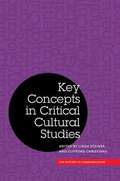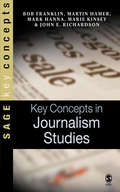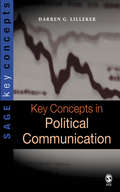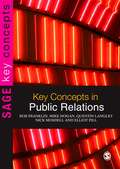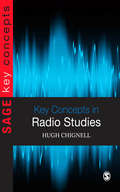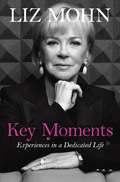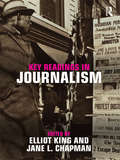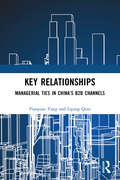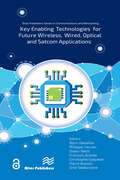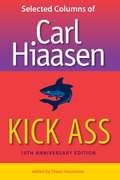- Table View
- List View
Key Concepts in Critical Cultural Studies
by Clifford Christians Linda SteinerThis volume brings together sixteen essays on key and intersecting topics in critical cultural studies from major scholars in the field. Taking into account the vicissitudes of political, social, and cultural issues, the contributors engage deeply with the evolving understanding of critical concepts such as history, community, culture, identity, politics, ethics, globalization, and technology. The essays address the extent to which these concepts have been useful to scholars, policy makers, and citizens, as well as the ways they must be rethought and reconsidered if they are to continue to be viable. Each essay considers what is known and understood about these concepts. The essays give particular attention to how relevant ideas, themes, and terms were developed, elaborated, and deployed in the work of James W. Carey, the "founding father" of cultural studies in the United States. The contributors map how these important concepts, including Carey's own work with them, have evolved over time and how these concepts intersect. The result is a coherent volume that redefines the still-emerging field of critical cultural studies. Contributors are Stuart Allan, Jack Zeljko Bratich, Clifford Christians, Norman Denzin, Mark Fackler, Robert Fortner, Lawrence Grossberg, Joli Jensen, Steve Jones, John Nerone, Lana Rakow, Quentin J. Schultze, Linda Steiner, Angharad N. Valdivia, Catherine Warren, Frederick Wasser, and Barbie Zelizer.
Key Concepts in Journalism Studies (SAGE Key Concepts series)
by Bob Franklin Martin Hamer Marie Kinsey Dr John E Richardson Mr Mark Hanna'The five authors have drawn on their enormous range of experience in newspaper and broadcast journalism, at national and regional level, as well as their teaching expertise for this book, which will be essential reading for students in journalism, and as invaluable reference tool for their professional careers' -www.HoldtheFrontPage.co.uk 'At long last, the undergraduate journalism A-Z. This is an excellent and much needed resource which should be on the list of every undergraduate journalism and media student' -Tim Rodgers, Kingston College The SAGE Key Concepts series provide students with accessible and authoritative knowledge of the essential topics in a variety of disciplines. Cross-referenced throughout, the format encourages critical evaluation through understanding. Written by experienced and respected academics, the books are indispensable study aids and guides to comprehension. Key Concepts in Journalism offers: - a systematic and accessible introduction to the terms, processes and effects of journalism - a combination of practical considerations with theoretical issues - further reading suggestions The authors bring an enormous range of experience in newspaper and broadcast journalism, at national and regional level, as well as their teaching expertise. This book will be essential reading for students in journalism, and an invaluable reference tool for their professional careers.
Key Concepts in Political Communication (SAGE Key Concepts series)
by Dr Darren LillekerThis is a systematic and accessible introduction to the critical concepts, structures and professional practices of political communication. Lilleker presents over 50 core concepts in political communication which cement together various strands of theory. From aestheticisation to virtual politics, he explains, illustrates and provides selected further reading. He considers both practical and theoretical issues central to political communication and offers a critical assessment of recent developments in political communication.
Key Concepts in Public Relations (SAGE Key Concepts series)
by Bob FranklinKey Concepts in Public Relations: Provides a comprehensive, easy-to-use overview to the field Covers over 150 central concepts in PR Paves the way for students to tackle primary texts Grounds students in both practice and theory Takes it further with recommended reading
Key Concepts in Radio Studies
by Hugh Chignell'This innovative and clearly written handbook does exactly what it claims on the cover, providing students with accessible and authoritative knowledge of the essential topics in Radio Studies... Chignell writes about radio with an engaging mixture of scholarly detachment and private passion' - The Radio Journal 'There is a need for a straightforward, wide-ranging, and up-to-date introduction to ways to study radio and other new audio-based media. Hugh Chignell's new book certainly fits the bill, and admirably takes the reader from initial ideas through to additional readings which explore the core issues in greater depth. It is crisply and engagingly written, draws upon a very good range of scholarship, and provides many useful contemporary examples... Students will find it an essential aid to their studies, and it may even go someway to ensuring that the study of radio is as important in the academy as its visual cousins' - Viewfinder 'This book is a useful starting point for radio students and staff, packed with citations and pithy comment from the author. It is a rich resource book for academic radio study at all levels' - Janey Gordon, University of Bedfordshire The SAGE Key Concepts series provides students with accessible and authoritative knowledge of the essential topics in a variety of disciplines. Cross-referenced throughout, the format encourages critical evaluation through understanding. Written by experienced and respected academics, the books are indispensible study aids and guides to comprehension. Key Concepts in Radio Studies: " Provides a comprehensive, easy-to-use introduction to the field " Grounds theory with global examples " Takes it further with recommended reading " Covers the central ideas and practices from production and media studies " Situates radio studies within its historical context and contemporary auditory culture
Key Issues in Translation Studies in China: Reflections and New Insights (New Frontiers in Translation Studies)
by Defeng Li Lily LimThis book revisits a number of key issues in Chinese Translation Studies. Reflecting on e.g. what Translation Studies researchers have achieved in the past, and the extent to which the central issues have been addressed and what still needs to be done, a group of respected scholars share their expertise in order to identify some tangible directions and potential areas for future research. In addition, the book discusses a number of key themes, e.g. Translation Studies as a discipline and its essential characteristics, the cultural dimension in translator training, paradigms of curriculum design, the reform of assessment for professional qualification, acts and translation shifts, the principle of faithfulness in translation, and interpreter’s cognitive processing routes. The book offers a useful reference guide for a broad readership including graduate students, and shares insiders’ accounts of various current topics and issues in Chinese Translation Studies. Given its scope, it is also a valuable resource for researchers interested in translation studies in the Chinese context.
Key Issues in the Teaching of Spanish Pronunciation: From Description to Pedagogy (Routledge Advances in Spanish Language Teaching)
by Rajiv RaoKey Issues in the Teaching of Spanish Pronunciation: From Description to Pedagogy is a resource that encourages Spanish teachers and curriculum designers to increase their incorporation of pronunciation into the classroom. Combining theory and practical guidance, it will help language practitioners integrate the teaching of Spanish pronunciation with confidence and effectiveness. The international group of scholars across its 15 chapters is made up of individuals with well-established research records and training in best pedagogical practices. Key features: A range of topics including vowels, various classes of consonants, prosody, the use of technology, the role of orthography, the importance of both perception and production, individual learner differences, and teacher training; Overviews of descriptive, empirical, and acquisition-based research associated with each aspect of the Spanish sound system; Guidance on the difficulties that teachers face when incorporating the teaching of pronunciation into the classroom; Clear explanations of concepts, accompanied by an abundance of concrete examples and references; Multiple sample activities and lesson plans tailored to different levels and backgrounds of students; A bilingual glossary of terms to help the content reach the widest audience possible. Written in a clear and accessible manner, Key Issues in the Teaching of Spanish Pronunciation is an essential resource for teachers of Spanish at all levels. It is also an excellent reference book for researchers and both undergraduate and graduate university students interested in Spanish phonetics and language acquisition.
Key Moments: Experiences in a Dedicated Life
by Liz Mohn"You always saw the world as your workplace."In 2009, this was how Reinhard Mohn--the man who turned Bertelsmann AG from an unremarkable, postwar German business into a successful, international media conglomerate--described the professional dedication of his wife, Liz Mohn. Born into a seemingly hopeless world, this girl from Wiedenbrück, Germany, grew into a proactive woman who, following her late husband's death, now represents the fifth generation of Bertelsmann's ownership. She sits on the company's supervisory board, where for decades she has brought unconventional ideas to a traditional media empire, and she also serves as vice chairwoman of the Bertelsmann Foundation's executive board. In her new book, Key Moments, Mohn tells her remarkable personal history, recalling with great candor the difficult early years in Gütersloh and how she grew into her role at the side of her influential husband. She met challenges with curiosity and a desire to learn from her mistakes. Through it all, she followed her life's motto: Try it. You can do it. An active philanthropist, Mohn highlights the importance of every individual being accountable to a greater good while appealing to the social responsibility of the political and economic sectors as well. She makes the case that each of us is called to contribute his or her part toward creating a successful future. This, of course, is what Liz Mohn has done all of her life. In light of her efforts and successes, she is often asked, "How do you do it all?" Key Moments gives readers a fascinating insight into the answer.
Key Readings in Journalism
by Jane Chapman Elliot KingKey Readings in Journalism brings together over thirty essential writings that every student of journalism should know. Designed as a primary text for undergraduate students, each reading was carefully chosen in response to extensive surveys from educators reflecting on the needs of today’s journalism classroom. Readings range from critical and historical studies of journalism, such as Walter Lippmann’s Public Opinion and Michael Schudson’s Discovering the News, to examples of classic reporting, such as Carl Bernstein and Bob Woodward’s All the President’s Men. They are supplemented by additional readings to broaden the volume’s scope in every dimension, including gender, race, and nationality. The volume is arranged thematically to enable students to think deeply and broadly about journalism—its development, its practice, its key individuals and institutions, its social impact, and its future—and section introductions and headnotes precede each reading to provide context and key points for discussion.
Key Relationships: Managerial Ties in China’s B2B Channels
by Pianpian Yang Liping QianThis book explores the governance and ramifications of managerial ties in China’s B2B contexts, with the aim of uncovering theoretical mechanisms and practical strategies for effective management of these relationships.In this book, managerial ties refer to personal relationships between corporate executives, business partners, and government or regulatory officials. While common in the Chinese business environment, these relationships are gaining recognition and value globally. Drawing on insights from four empirical studies, the authors focus on managerial ties within channel relationships among Chinese firms. The book analyzes how business and political ties affect channel outcomes, highlights the limitations of managerial ties in emerging markets, and identifies conditions or mechanisms that may lead to negative effects.This work will be valuable to researchers and students of business management and relationship marketing, as well as to business professionals interested in Chinese business practices and multinational companies operating in China.
Key Technologies of Internet of Things and Smart Grid (Advanced and Intelligent Manufacturing in China)
by Xianwu Zeng Shuping BaoThis book focuses on the key technology applied Internet of things and smart grid, which include some novel ICT technologies such as big data, edge computing, 5G, and wide area wireless communication technology. The mutual penetration, deep integration, and wide application of smart grid and IoT effectively integrate communication infrastructure resources and power system infrastructure resources, further realize energy conservation and emission reduction, improve the level of grid informatization, automation, and interaction, and improve grid operation capacity and quality of service. These key technologies are presented and studied in detail, which help readers deeply understand those key technologies to apply IoT and grid. The book benefits researchers, engineers, and graduate students in the fields of IoT and energy systems, etc.
Key Terms in Comics Studies (Palgrave Studies in Comics and Graphic Novels)
by Simon Grennan Erin La Cour Rik SpanjersKey Terms in Comics Studies is a glossary of over 300 terms and critical concepts currently used in the Anglophone academic study of comics, including those from other languages that are currently adopted and used in English. Written by nearly 100 international and contemporary experts from the field, the entries are succinctly defined, exemplified, and referenced. The entries are 250 words or fewer, placed in alphabetical order, and explicitly cross-referenced to others in the book. Key Terms in Comics Studies is an invaluable tool for both students and established researchers alike.
Key enabling technologies for future wireless, wired, optical and satcom applications (River Publishers Series in Communications and Networking)
by Pierre Busson Björn Debaillie François Brunier Philippe Ferrari Didier Belot Christophe Gaquiere Urtė SteikūnienėThis book presents the latest research roadmaps and achievements from the European ecosystem (industry, research, and academia) driving the development of future wireless, wired, optical and satcom applications utilising the mm-wave and sub-THz bands. It covers the entire value chain, including technologies, devices, characterisation, architectures, circuits, 3D heterogeneous integration and packaging.As the interconnectedness of our world continues to expand, the importance of global innovation in communication systems and technologies grows significantly. The increasing reliance on digital communication necessitates systems that can manage higher data traffic, provide faster and more reliable connectivity, and sustainably support a diverse range of applications. Achieving these goals requires a shift towards higher frequency bands (mm-wave and sub-THz) and the adoption of disruptive technologies. Heterogeneous integration of (Bi)CMOS, SOI, and III/V components such as GaN or InP, along with advanced packaging techniques, is essential to realise ubiquitous, ultra-high bandwidth, and low latency networks. To ensure that future communication systems are not only technologically advanced but also sustainable and responsible, it is crucial to minimize their environmental impact by considering the materials used, manufacturing processes, operational efficiency, and recyclability.The book captures the synergetic interactions between European Chips JU projects SHIFT and Move2THz, the European 3D heterogenous integration and packaging community and the MTT-TC9 society. These interactions were forged during the International Workshop on "Key Enabling Technologies for Future Wireless, Wired, Optical and Satcom Applications" at the European Microwave Week in Paris, France, on 22 September, 2024.Whether you are a professional in the field or simply interested in the future of communication technologies, this book offers invaluable insights into the technological breakthroughs shaping our digital future.The Open Access version of this book, available at http://www.taylorfrancis.com, has been made available under a Creative Commons Attribution-Non Commercial (CC-BY-NC) 4.0 license.
Key to Latin Hexameter Verse: An Aid to Composition (Routledge Revivals)
by S. E. WinboltOriginally published in 1903.
Keyboarding and Word Processing Essentials: Microsoft Word 2010 (18th Edition)
by Susie H. Vanhuss Connie M. Forde Donna L. WooThe Eighteenth Edition of KEYBOARDING AND WORD PROCESSING ESSENTIALS, LESSONS 1-55 uses proven techniques to help readers master the keyboarding and formatting skills they need for career success-from initial new-key learning to expertise in formatting business documents with Microsoft Word 2010. South-Western College Keyboarding offers a proven, time-tested approach that helps readers develop a strong foundation in basic keyboarding, steadily improve their skills, and rapidly become proficient in document formatting and business communication. Each lesson is clearly focused, well structured, and designed to provide step-by-step training and reinforcement to help readers quickly acquire and apply new skills. This one-book solution includes 55 lessons, documents, and software instructions within a space-saving easel-back format.
Keynes: The Return of the Master (Very Short Introductions Ser.)
by Robert SkidelskyWhen unbridled capitalism falters, is there an alternative? The smartest and, for most of the century, most influential economist, tells us that there is. 'In the long run,' Keynes famously said, 'we are all dead'. But John Maynard Keynes has never been quite dead, and has led a ghostly half-life in the corridors of central banks, treasuries and in the economics profession for decades. In the current financial crisis Keynes has been taken out of his cupboard, dusted down, consulted, cited, invoked and appealed to about how a rescue operation can be effected. But very little attention has so far been paid to Keynes's explanation of why economies experience these sorts of collapses. There are three main ideas of Keynes's worth thinking about now. The first is that the future is unknowable, and therefore that economic storms, especially those originating in the financial system, are not random shocks which impinge on smoothly-adjusting markets, but part of the normal working of the market system. The second idea is that economies wounded by these 'shocks' can, if left to themselves, stay in a depressed condition for a long time. That is why governments need to have and use fiscal ammunition to prevent a slide from financial crisis to economic depression. The third is a moral critique of societies which worship the pursuit of money and efficiency above all other objects of human striving. No one has bettered Keynes's description of the psychology of investors during a financial crisis: 'The practice of calmness and immobility, of certainty and security, suddenly breaks down. New fears and hopes will, without warning, take charge of human conduct . . . the market will be subject to waves of optimistic and pessimistic sentiment'. The ideas of John Maynard Keynes have never been more timely.
Keywords: The New Language of Capitalism
by John Patrick Leary&“A clever, even witty examination of the manipulation of language in these days of neoliberal or late stage capitalism&” (Counterpunch). From Silicon Valley to the White House, from kindergarten to college, and from the factory floor to the church pulpit, we are all called to be innovators and entrepreneurs, to be curators of an ever-expanding roster of competencies, and to become resilient and flexible in the face of the insults and injuries we confront at work. In the midst of increasing inequality, these keywords teach us to thrive by applying the lessons of a competitive marketplace to every sphere of life. What&’s more, by celebrating the values of grit, creativity, and passion at school and at work, they assure us that economic success is nothing less than a moral virtue. Organized alphabetically as a lexicon, Keywords explores the history and common usage of major terms in the everyday language of capitalism. Because these words have infiltrated everyday life, their meanings may seem self-evident, even benign. Who could be against empowerment, after all? Keywords uncovers the histories of words like innovation, which was once synonymous with &“false prophecy&” before it became the prevailing faith of Silicon Valley. Other words, like best practices and human capital, are relatively new coinages that subtly shape our way of thinking. As this book makes clear, the new language of capitalism burnishes hierarchy, competition, and exploitation as leadership, collaboration, and sharing, modeling for us the habits of the economically successful person: be visionary, be self-reliant—and never, ever stop working.
Keywords;: For Further Consideration and Particularly Relevant to Academic Life, &c.
by D. Graham Burnett a Community of Inquiry Matthew Rickard Jessica TerekhovAn irreverent critical lexicon of academic life and cultureThe university: The very name evokes knowledge, culture, and the magnificently universal ambition at the heart of this essential institution. Bastions of free inquiry and a free society, engines of social transformation and economic progress, enclosed gardens of ennobling reflection and creation, universities encompass the wisdom of the past and the hope of the future. Or do they? This critical glossary—written by a group of Princeton graduate students and faculty—defines fifty-eight terms common to academic life in a style that will prick both egos and consciences. From “academia” to “vocation,” “canon” to “peer review,” “discipline” to “methodology,” the book scrutinizes the often stultifying structures of modern disciplinary life, calls out a slavish devotion to “knowledge production” as the enemy of thought, and even dissects the notion of “academic excellence.” Feisty and darkly funny, passionate and deeply insightful, this book raises hard questions about teaching, research, theory, practice, and academic labor. The result is a must-read dispatch from today’s academic trenches—one that is sure to provoke discussion and debate.
Khushwant Singh: The Legend Lives On . . .
by Rahul SinghHere was a man. Prolific writer Acerbic critic Editor nonpareil Trenchant humourist Connoisseur of single malt Lover of life, words, women, and all things beautiful ‘You know that I am 99 years old.’ I replied: ‘May my years be added to yours.’ He looked up at me with the softest expression, and said: ‘No, but may you live as long as I have.’ I held his hand, the hand that had spent a lifetime writing books and inimitable articles, and kissed it. He brushed his cheek with mine. Both of us knew that it was a farewell. I left and stood on the gravel outside … – Fakir Syed Aijazuddin, Features Writer, Dawn … the Patiala Peg of publishing is no more! But we will continue to raise our glasses and thank him for liberating us from our idiotic, hypocritical, fake, humourless lives … for making us laugh at ourselves … for ridding us of quaint sexual hang-ups … for chucking old rules into the waste basket … for caring a damn! Jeena isi ka naam hai! – Shobhaa Dé, Bestselling Author
Kick Ass: Selected Columns of Carl Hiaasen
by Carl Hiaasen Diane StevensonIn the words of Carl Hiaasen, "You just cover a lot of territory and you do it aggressively and you do it fairly and you don't play favorite sand you don't take any prisoners. It's the old school of slash-and-burn metropolitan column writing. You just kick ass. That's what you do. And that's what they pay you to do."
Kids' Slips: What Young Children's Slips of the Tongue Reveal About Language Development
by Jeri J. JaegerThe study of speech errors, or "slips of the tongue," is a time-honored methodology which serves as a window to the representation and processing of language and has proven to be the most reliable source of data for building theories of speech production planning. However, until Kids' Slips, there has never been a corpus of such errors from children with which to work. This is the first developmental linguistics research volume to document how online processing is revealed in young children, ages 18 months through 5 years, through their slips of the tongue. Thus, this text provides a new methodology and data source, which will greatly expand our ability to uncover the details of early language development. Professor Jaeger's groundbreaking book incorporates both details of her methodology and findings with implications for different aspects of language development, including phonetics and phonology, the lexicon, semantics, morphology, and syntax. While all the child data is included in the book, a Web site hosted by the author provides readers with the adult data as well. Kids' Slips targets those who study language development in linguistics, developmental psychology, and speech and hearing, as well as those who study language representation and processing more generally in the same disciplines.
Kiku: The Japanese Art of Good Listening
by Haru YamadaListening connects us to others and the world around us. Learn how to harness its power in this life-changing new book.Drawing on the Japanese concept of 'kiku', sociolinguist and listening expert Haru Yamada shares a transformational guide to becoming better listeners in our daily life. Kiku is a particular type of listening that goes beyond the superficial. It is a deep listening that brings us together.Kiku offers a brand-new insight into the art of listening and an informative roadmap to help you to listen with intention and meaning in your daily interactions. Once you understand how hearing and listening work, you'll start noticing your own. You will gain a deeper understanding of the world. You'll read rooms better because you'll be reading more deeply between the lines of the people around you. Kiku is an essential guide to unlocking the power of listening in your relationships, at work and at home, and in the wider world around you.
Kiku: The Japanese Art of Good Listening
by Haru YamadaListening connects us to others and the world around us. Learn how to harness its power in this life-changing new book.Drawing on the Japanese concept of 'kiku', sociolinguist and listening expert Haru Yamada shares a transformational guide to becoming better listeners in our daily life. Kiku is a particular type of listening that goes beyond the superficial. It is a deep listening that brings us together.Kiku offers a brand-new insight into the art of listening and an informative roadmap to help you to listen with intention and meaning in your daily interactions. Once you understand how hearing and listening work, you'll start noticing your own. You will gain a deeper understanding of the world. You'll read rooms better because you'll be reading more deeply between the lines of the people around you. Kiku is an essential guide to unlocking the power of listening in your relationships, at work and at home, and in the wider world around you.
Kiku: The Japanese Art of Good Listening
by Haru YamadaInspired by the Japanese concept of kiku—a more engaged, empathetic style of listening—a sociolinguistics researcher and writer offers a ground-breaking guide to more intentional and meaningful communication. No other life form turns noise into sound, sound into language, then language into understanding quite the way we humans do when we listen. As a sociolinguist who grew up in different places with very different languages, Haru Yamada has always been fascinated with the way people navigate their day listening to language systems that code the world in such dramatically different ways. And it was as Haru was recovering in the ICU from an accident that had inflicted a permanent hearing disability when she rediscovered the extraordinary benefit found in the science of listening—the critical intelligence we need to learn and grow and get better. Now, Haru Yamada offers a practical guide to more effective listening as a perceptive, creative exercise. We don&’t just listen to what people say and don&’t say, we reconstruct what someone else is saying and doing and meaning and feeling. Listening is a skill that requires our physical ear and brain power and the effort of our creative mind and social heart to remix what we hear from others and recreate it within ourselves. Kiku will allow you to harness the vital energy of listening to connect, sustain, and enhance the relationships you have with your friends, families, and professional teams.
Kill All Normies: Online Culture Wars From 4Chan And Tumblr To Trump And The Alt-Right
by Angela NagleRecent years have seen a revival of the heated culture wars of the 1990s, but this time its battle ground is the internet. On one side the alt right ranges from the once obscure neo-reactionary and white separatist movements, to geeky subcultures like 4chan, to more mainstream manifestations such as the Trump-supporting gay libertarian Milo Yiannopolous. On the other side, a culture of struggle sessions and virtue signalling lurks behind a therapeutic language of trigger warnings and safe spaces. The feminist side of the online culture wars has its equally geeky subcultures right through to its mainstream expression. Kill All Normies explores some of the cultural genealogies and past parallels of these styles and subcultures, drawing from transgressive styles of 60s libertinism and conservative movements, to make the case for a rejection of the perpetual cultural turn.
